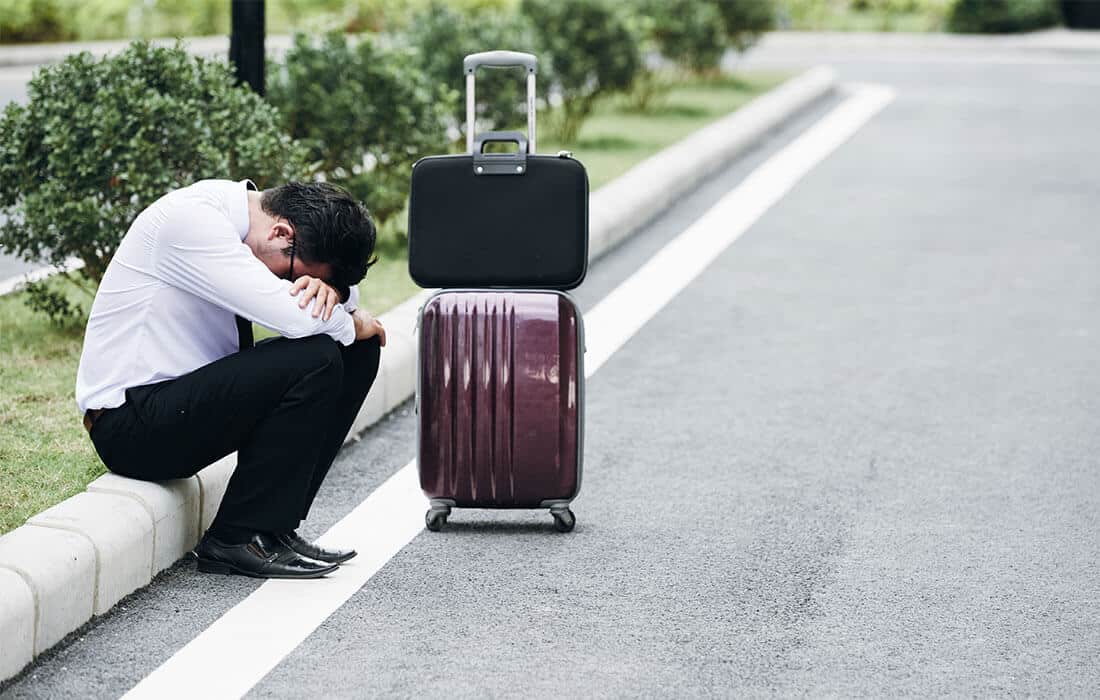Jet Lag Got You Down? Here’s How to Push Through
You’ve just endured a multi-hour flight across several time zones, and now your internal clock is in disarray. As your body tries to adapt to the abrupt change in daily cycle, you find yourself wide awake in the middle of the night and dragging during the day. Jet lag has struck, and it’s hitting you hard. The good news is there are several strategies you can employ to reduce the effects of jet lag and get back to functioning at your best. By exposing yourself to natural light, using melatonin supplements, staying hydrated, and avoiding heavy meals and alcohol, you can trick your body into syncing back up with the local time at your destination. With some self-care and patience, you’ll be back on a normal schedule in no time. Read on to discover how you can push through the inevitable fatigue and grogginess of jet lag.
Prepare for Your Trip and Set the Right Mindset
To minimize the effects of jet lag on your trip, proper preparation and the right mindset are key.
First, adjust to your destination’s time zone before you leave. Shift your sleep schedule, meal times, and light exposure towards the new time zone. This helps reset your circadian rhythm and internal clock. Two to three days before traveling, start shifting by about an hour each day.
Second, hydrate and avoid alcohol or caffeine. Drink plenty of water to avoid dehydration from the dry air in planes. Limit coffee, tea and alcohol intake, which can disrupt your sleep. Get some light exercise like walking around the cabin to keep your blood flowing.
Third, start your trip well-rested. Try to sleep well the night before your flight and nap during long hauls. Use eye masks, earplugs, pillows and blankets to sleep comfortably. Melatonin or over-the-counter sleep aids can help if needed.
Lastly, expose yourself to daylight at your destination as soon as possible. This helps reset your circadian clock to the local time. Try to stay awake until evening if arriving during the day. Take short walks outside and open the curtains to let light in.
With preparation, the right mindset and self-care strategies, you can push through the worst of jet lag. Stay hydrated, well-rested and expose yourself to destination time cues. Your body will adjust in a few days, but taking these proactive steps will help you feel less fatigued and enjoy your trip sooner.
Stay Hydrated and Avoid Alcohol on the Flight
To minimize the effects of jet lag on long flights, it is essential to stay properly hydrated and avoid alcohol.
Drink Plenty of Water
Consume water regularly before, during, and after your flight. Staying hydrated will help you feel more alert and ease discomfort from the dry air in the cabin. Aim for 6-8 ounces of water every hour or so. Bring an empty bottle through security and fill it at a water fountain once inside the terminal.
Avoid Alcohol and Caffeine
Both alcohol and caffeine can disrupt your sleep and dehydrate you, exacerbating symptoms of jet lag like fatigue, irritability, and restlessness. Opt for decaffeinated beverages and drink in moderation.
Walk Around the Cabin
If possible, get up and walk around the cabin periodically. Gentle exercise or just standing up and stretching your legs can help reduce fluid buildup and make it easier to sleep. Take a quick stroll up and down the aisle every 30-60 minutes.
Sleep if it’s Nighttime at Your Destination
Try to sleep during the flight if it’s nighttime at your final destination. Use earplugs, an eye mask, neck pillow, blanket, sleep aids like melatonin to help you rest comfortably. Sleeping when it’s nighttime at your destination helps reset your body clock to the new time zone.
By staying hydrated, avoiding alcohol and caffeine, walking around, and sleeping when it’s night at your destination, you can minimize the effects of jet lag and start enjoying your trip as soon as you arrive. With the right in-flight routine, your body will transition smoothly to the new time zone.
Move Around and Stretch on Long Flights
On long flights, it’s important to keep your body moving to minimize the effects of jet lag and sitting for extended periods. Some simple exercises you can do include:
Walk around the cabin
Take opportunities to get up and walk around, even if it’s just walking up and down the aisle a couple times. This helps stimulate blood flow and provides light exercise.
Stretch your legs
While seated, straighten one leg and bend the other, leaning forward to touch your toes. Switch and repeat. You can also rotate your ankles in circles, flex and extend your feet, and bend one knee at a time toward your chest.
Stretch your torso
Slowly twist your torso side to side. Reach one arm overhead and bend sideways at the waist, stretching your arm over towards the opposite side. Release and repeat on the other side. You can also curl forward at the waist with your arms extended in front of you.
Move your neck
Slowly roll your head in circles, first in one direction and then the other. Tilt your head side to side, trying to touch your ear to your shoulder. Extend your neck up and back, then forward and down.
Do shoulder rolls
Roll your shoulders slowly forward and backward to loosen the joints and muscles. Raise your shoulders up toward your ears and hold, then release down.
Extend and flex
Straighten one arm overhead and use your other hand to gently pull it across your body to stretch. Bend one elbow and use your other hand to pull the arm behind your back. Release and switch arms.
Change positions
If possible, adjust your seat to different angles for variety. You can recline the seatback, raise the leg rest, lean it forward slightly, or return it to the upright position. Changing positions helps prevent stiffness and soreness.
Doing some light exercise and stretching, staying hydrated, and changing positions on long flights can help reduce the effects of jet lag and keep you as comfortable as possible during your journey. Make the most of your opportunity to move around the cabin and follow the suggestions above for the best results.
Adjust to the Local Time Zone ASAP
To overcome jet lag as quickly as possible, it is essential to adjust to the local time zone of your destination immediately.
Exposure to Sunlight or Bright Light
Exposure to natural sunlight or bright artificial light helps reset your circadian rhythm to the new time zone. As soon as you arrive, spend time outside during the day or use a light therapy box. The sunlight or bright light will cue your body to be awake and signal that it’s daytime in your new location.
Avoid Caffeine and Heavy Meals
Both caffeine and large meals can disrupt your sleep-wake cycle. Avoid them in the few hours before your desired bedtime. Caffeine’s effects can last for several hours and a heavy meal right before bed can be uncomfortable when you’re trying to sleep.
Take Melatonin
The supplement melatonin can help you establish a new sleep-wake cycle. Take a low dose of melatonin (0.5 to 3 mg) at your desired bedtime. Start with the lowest effective dosage for you. Melatonin works best when taken at the same time each day so you can establish a regular sleep-wake pattern. You may need to take it for a few days until your body adapts to the new schedule.
Go to Sleep at the Local Bedtime
The most important step is to go to bed at the local bedtime, even if you don’t feel tired. This will align your body clock to the new time zone. Force yourself to turn off the lights and avoid looking at bright screens before bed. You may struggle to fall asleep at first, but stick to the schedule. Your body will adjust over a few days.
Be Patient and Give Yourself Time to Adjust
Don’t plan intense activities for the first couple of days after long-haul travel. Take it easy while your body is adjusting to the new time zone. Most people need at least one day to adjust for every hour of time difference. With consistency, your circadian rhythm will adapt to the local schedule and jet lag symptoms will improve rapidly. Staying hydrated, exercising and exposing yourself to sunlight during the day can also help you feel better as your body transitions.
Take Care of Yourself During Recovery
Recovering from jet lag requires self-care. Getting adequate rest and nutrition will help your body adjust to the new time zone.
Prioritize Sleep
Aim for 8 hours of sleep per night in the new time zone. Go to bed at the same time each night and wake up at the same time each morning, even on weekends. Having a consistent sleep schedule will reset your circadian rhythm. Melatonin supplements or light therapy may help in the initial adjustment period.
Stay Hydrated and Fed
Drink plenty of water to avoid dehydration and combat fatigue. Have small, frequent meals and snacks with a balance of protein, carbohydrates, and healthy fats. Some good options include nuts, avocados, eggs, yogurt, and lean meats. Limit caffeine and alcohol intake, which can disrupt your sleep.
Get Exposure to Daylight
Spending time outside during the day helps set your body’s circadian clock to the local time zone. Try to get at least 30 minutes of exposure to natural light every day. Walking, jogging or other light exercise is ideal. If it’s not possible to go outside, using a light therapy device can have a similar effect.
Avoid Heavy Physical Activity
While light activity and exercise are good, avoid strenuous workouts during the recovery period. Heavy exercise may disrupt your sleep and delay adjustment to the new time zone. Limit intense physical activity for the first few days.
Be Patient with Yourself
It can take one day for every hour of time difference to fully adjust to a new time zone. Be gentle with yourself during the transition. Don’t plan overly ambitious schedules and allow extra time for rest. Your cognitive abilities and productivity may be temporarily reduced. Staying in the present moment will make the adjustment period easier to navigate. With self-care, your body and mind will soon sync to your new location.
Conclusion
As you arrive at your destination, the effects of jet lag may hit you hard. However, with some preparation and by following a few key tips, you can minimize the impact and get back to functioning at your best as quickly as possible. Staying hydrated, exposing yourself to natural light, and sticking to a normal sleep schedule will help reset your body clock. Avoiding screens and bright lights before bed is also important for restorative rest. While it can be tempting to power through jet lag, listen to your body and rest when needed. With time and patience, you will adjust to the new time zone and be enjoying your trip in no time. By planning ahead and making self-care a priority upon arrival, you can overcome jet lag and start enjoying your destination with energy and enthusiasm.






